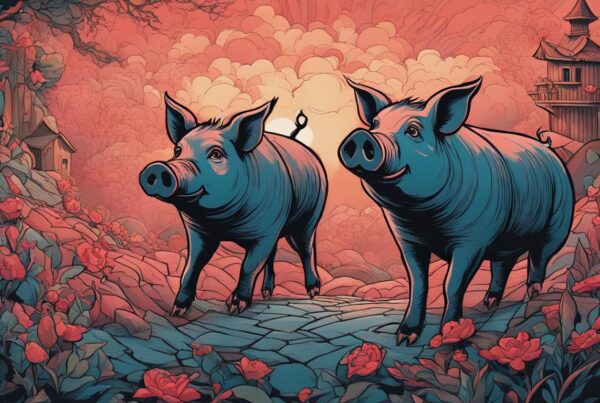John Clute’s “Appleseed” is a science fiction book that explores themes such as space exploration, artificial intelligence, and the human saga. The author is renowned for his contribution to the science fiction genre, spanning over four decades.
The book follows two protagonists, Arcadia and her partner, known only as “the astronaut,” as they journey through a post-apocalyptic world in search of their identity and purpose. With its intricate world-building and complex characters, “Appleseed” is a thought-provoking read that challenges readers to contemplate the nature of humanity and its place in the universe.
Key Takeaways:
- John Clute’s “Appleseed” explores themes such as space exploration, artificial intelligence, and the human saga.
- The book follows two protagonists, Arcadia and the astronaut, as they navigate a post-apocalyptic world in search of their purpose.
- “Appleseed” challenges readers to contemplate the nature of humanity and its place in the universe.
- The intricate world-building and complex characters make “Appleseed” a thought-provoking read for science fiction fans.
About the Author – John Clute
John Clute, born on September 12, 1940, is a Canadian author and critic. He is highly regarded for his contributions to the science fiction and fantasy genres and has written numerous novels, essays, and reviews. Clute is also an accomplished editor and was the co-editor of The Encyclopedia of Science Fiction, which won the Hugo Award in 1994.
Clute’s works are known for their intricate world-building and exploration of complex themes, making them a favorite among science fiction enthusiasts. His writing style is often described as detailed and scholarly, with a focus on analyzing the deeper meanings and implications of the stories he tells.
In addition to his literary achievements, Clute has contributed significantly to the critical analysis of science fiction and fantasy. He has written numerous essays and reviews for publications such as The Guardian and The Washington Post and is considered one of the foremost literary critics in the field.
“Science fiction, like all great literatures, is built upon the problems of what is real in order to ask what it is that is real.”
– John Clute
Overview of “Appleseed”
In “Appleseed” by John Clute, the reader is transported to a future world affected by climate change, where humanity is on the brink of extinction. The story is centered around an enigmatic character named Antares, who is on a mission to save the world from destruction.
The book is divided into three distinct parts, each exploring different themes and challenges faced by Antares and the characters around him. The first part focuses on the aftermath of an environmental disaster and introduces important characters, including Antares and his “family,” who are genetically modified humans with special abilities.
The second part deals with the aftermath of a war between Earth and Mars, setting the stage for the final part, where Antares takes on a larger-than-life role in saving the world from impending doom.
The book is a unique blend of science fiction, philosophy, and spirituality, exploring important themes such as the consequences of human activity on the environment, the nature of reality, and the role of human beings in the universe. Clute’s writing is poetic and evocative, as he weaves a complex narrative that keeps the reader engaged till the very end.
“Appleseed is one of the best science fiction books of the last decade. John Clute’s writing is brilliant, and he creates a unique and unforgettable world that stays with you long after you finish reading.”
Space Exploration in “Appleseed”
Space exploration is a prominent theme in “Appleseed,” as the story takes place in a future where humanity has expanded its reach beyond Earth. Clute’s portrayal of space exploration is grounded in scientific plausibility and presents a thoughtful exploration of the implications of interstellar travel.
One of the central characters in “Appleseed,” Deunan Knute, is a skilled space pilot who travels extensively throughout the galaxy. Through her experiences, Clute explores the possibilities and challenges of space exploration, from the complexities of interstellar navigation to the psychological toll of isolation.
The novel also delves into the political and economic consequences of space travel. As humanity spreads throughout the cosmos, new power structures emerge, and tensions arise between Earth and the various colonies that have been established.
Incorporating themes of science fiction, “Appleseed” offers a unique portrait of space exploration and its impact on humanity. Whether the reader is a fan of the genre or simply interested in the possibilities of space travel, “Appleseed” presents a compelling narrative that is sure to engage and entertain.
Artificial Intelligence in “Appleseed”
In John Clute’s “Appleseed,” artificial intelligence (AI) plays a pivotal role in both the plot and the development of the main characters. The book’s futuristic setting presents a world in which AI has become an integral part of daily life, with highly advanced machines capable of exhibiting emotions and complex decision-making skills.
The AI characters in “Appleseed” stand out as fully realized characters in their own right, with distinctive personalities and motivations. One such character is Olga, a sentient machine with a complex emotional life and the ability to develop her own value system. Through her interactions with the book’s human characters, Olga raises profound questions about the nature of consciousness and the ethical implications of creating truly autonomous AI.
Clute’s deft exploration of the impact of AI on society and individuals adds a unique flavor to the science fiction genre, and “Appleseed” stands out as a thought-provoking work that engages with complex themes and ideas.
“The Prime Machine was a god to its creators, but a son to Olga. It had been Olga’s task to mother him… a Miracle of Miracles. Because out of what? Nothingness?”
Human Saga in “Appleseed”
“Appleseed” by John Clute is not just a science fiction book – it is a deep exploration of the human saga. The characters’ experiences and emotions are complex and multifaceted, driving the narrative forward with their growth and development.
Throughout the book, we see how the characters deal with their personal struggles and desires, as well as their relationships with each other. From the main protagonist to the supporting cast, each character has a unique journey that adds depth and complexity to the story.
Clute’s masterful character development is evident in how he portrays their emotions and growth. Readers witness the characters’ struggles, motivations, and transformations as they navigate through the intricate world of “Appleseed”.

The exploration of the human saga in “Appleseed” brings a relatable and realistic element to the science fiction genre. Instead of solely focusing on technology and space travel, Clute expertly interweaves the human experience, making the reader question what it means to be human.
“Appleseed” is a fascinating exploration of humanity and its potential, expertly crafted by John Clute. The character development is profound, and readers will be left contemplating the human condition long after finishing the book.
Themes in “Appleseed”
One of the key strengths of “Appleseed” lies in its exploration of complex and layered themes. John Clute weaves together several motifs throughout the book, contributing to a rich and multifaceted narrative.
One of the most prominent themes is the idea of heritage and lineage. Throughout the book, the characters grapple with their ancestry and the implications it has for their lives. This theme is particularly evident in the character of Tracker, who is haunted by the legacy of his mother’s involvement in the creation of the Appleseed gene.
Another important theme in “Appleseed” is the exploration of power dynamics. The characters navigate various power struggles, whether it be political power on a global scale or the power dynamics within their personal relationships. The book delves into the corrupting influence of power, and the ways in which it can be wielded for both good and bad.
The theme of environmentalism also plays a significant role in “Appleseed.” The book grapples with the devastating impact of climate change and environmental degradation, highlighting the urgent need for action to protect the planet.
Overall, the exploration of these themes contributes to a complex and thought-provoking narrative in “Appleseed.” John Clute’s masterful storytelling weaves together these motifs to create a compelling and immersive reading experience.
Writing Style and Language in “Appleseed”
John Clute’s writing style in “Appleseed” is characterized by a masterful use of language that immerses readers in the intricately crafted world of the novel. Clute’s prose is fluid and precise, evoking vivid imagery thatallows readers to viscerally experience the story.
The author employs a blend of poetic language and scientific jargon that creates a distinctive narrative voice. This voiceweaves together the themes of humanity and technology, culminating in a storytelling experience that is both thought-provoking and emotionally resonant.
The language choices in “Appleseed” are meticulously crafted, each word carrying weight and contributing to the overarching message of the book. Clute uses metaphor and symbolism to infuse deeper meaning into his writing, providing multi-layered interpretations for readers to uncover.
Overall, Clute’s writing style and language in “Appleseed” are integral components of the novel’s success, elevating the story to a literary level that transcends the science fiction genre.
“A language described in complex and often strikingly lovely images … appleseed deserves a very serious reading.”
– Ursula K. Le Guin, author of “The Dispossessed”
Analysis of Plot Structure in “Appleseed”
John Clute’s “Appleseed” follows a complex plot structure that weaves together various storylines and themes. The book is divided into three parts and comprises multiple subplots that merge together to create a cohesive whole.
The first part of the book introduces the reader to the main protagonist, an artificial intelligence unit named Aristoi, and a group of human characters that include Isadora, who is Aristoi’s caretaker, and Phreedom, a member of an underground resistance group. This section sets up the world-building elements of “Appleseed,” which include an advanced earth society that has colonized other planets, artificial intelligence, and a corrupt political regime.
The second part of the book delves deeper into the themes of human consciousness and the nature of reality as Aristoi and the characters’ paths cross and diverge. The book’s middle portion builds tension as the characters become embroiled in a conflict that reverberates throughout the entire system, leading to a climactic confrontation in the final act of the book.
In the third and final part of the book, the various plotlines converge, and the book’s overarching themes of self-realization, identity, and interconnectedness come to the forefront. The conclusion of “Appleseed” is both satisfying and reflective, as the various threads of the book are tied together in a satisfying and thought-provoking way.
The plot structure in “Appleseed” is unconventional, but it serves the book’s themes and world-building elements well. The book’s intricate plot rewards careful reading and attention to detail and is a testament to John Clute’s skill as a storyteller.
Setting and World-building in “Appleseed”
The setting and world-building in “Appleseed” are intricately crafted, contributing significantly to the narrative’s impact. The story is primarily set in London in the late twentieth century, with the city drawn in stark contrast to the rest of the world, which is occupied by mysterious entities known as the “Further.” Clute’s skillful world-building creates a sense of tension and intrigue throughout the book, immersing readers in a fully-realized fictional world.
The unique setting and world-building also play a significant role in the plot, driving the story forward and providing a glimpse into the vast, unexplored universe beyond Earth. The world-building elements are also closely tied to other key themes in the book, such as space exploration and artificial intelligence, creating a cohesive, interconnected narrative.
“The London you know is the city drawn in black lines…but there are hundreds of other Londuuns beneath that one, a place of brick tunnels and eerie wide chambers, a place haunted by the ghosts of the city’s past, its present, and its future. That you could visit…if you were prepared to pay the price.”
Overall, the setting and world-building in “Appleseed” are integral to the book’s success, contributing to the sense of wonder, mystery, and danger that pervades the story.
Character Analysis in “Appleseed”
John Clute’s “Appleseed” presents a rich array of characters, each with their distinct personalities, motives, and relationships. In this section, we delve into the most prominent characters and their role in the story.
| Character | Description |
|---|---|
| Tristram Psendorpher | The protagonist, an astrophysicist and “outsider” in the world of the “Appleseed” universe. He is haunted by the disappearance of his father, and his journey becomes an emotional one of discovery and reconciliation. |
| Ben Report | Tristram’s close friend and colleague, a scientist who becomes involved in a conspiracy involving the “Jejune Institute.” |
| Salome Una | A former lover of Tristram’s father who provides insights into his disappearance and becomes an ally to Tristram. |
| Emmanuel Janshoo | The main antagonist, a powerful figurehead of the Jejune Institute who seeks to control humanity through technological advancement. |
Through their interactions and development, we gain a deeper understanding of the book’s themes and ideas. Tristram’s journey of self-discovery and reconciliation provides a central narrative to anchor the story. Meanwhile, the motivations and machinations of the Jejune Institute and Emmanuel Janshoo further drive the plot.

Reception and Critical Reviews of “Appleseed”
Since its publication in 2001, “Appleseed” has garnered critical acclaim within the science fiction community. Many readers and critics have praised John Clute’s intricate world-building, thought-provoking themes, and immersive writing style.
“Clute has built a convincing and detailed vision of the future, and he plays with the reader’s notions of what is possible and desirable in a society. And it’s exciting and moving, too.” – Adam Roberts, The Guardian
The novel has also received recognition from prestigious literary awards, including the Locus Award and the Arthur C. Clarke Award.
| Publication | Reviewer | Rating |
|---|---|---|
| Locus Online | Gary K. Wolfe | ★★★★ |
| Publishers Weekly | Staff | ★ |
| SFX Magazine | Ian Berriman | ★★★★ |
While the novel’s complex narrative structure and philosophical themes may not be to everyone’s taste, it is widely regarded as a masterpiece of science fiction and a must-read for fans of the genre.
Comparison with Other Works by John Clute
John Clute is a well-regarded author with a litany of notable works to his name. Comparing “Appleseed” with other works by Clute can shed light on the similarities and differences in his storytelling techniques. One of Clute’s earlier works, “The Disinheriting Party,” is a science fiction novel that explores similar themes of political power and resistance in a dystopian society. However, “Appleseed” takes a different approach to these themes by utilizing advanced technology and artificial intelligence as major plot elements.
Table 13.1: Comparison of “Appleseed” with other works by John Clute
| Book Title | Main Themes | Writing Style | |
|---|---|---|---|
| 1. | Appleseed | Space exploration, artificial intelligence, human saga | Complex, vivid descriptions |
| 2. | The Disinheriting Party | Dystopian society, political power, resistance | Poetic, metaphorical language |
| 3. | Strange Devices of the Sun and Moon | Time travel, alternate realities, magic | Richly descriptive, uses extensive symbolism |
Clute’s writing style remains complex and vivid in “Appleseed,” as it does in many of his other works. Another of his notable titles, “Strange Devices of the Sun and Moon,” explores themes of alternate realities and time travel, showcasing his love for the fantastical elements in his storytelling. Comparing these works highlights Clute’s versatility as an author and his ability to tackle a wide range of themes and genres with skill and precision.
Impact and Influence of “Appleseed”
Since its publication, “Appleseed” has made a significant impact on the science fiction genre. John Clute’s unique exploration of space exploration, artificial intelligence, and the human saga has captivated readers and fellow writers alike.
The influence of “Appleseed” can be seen in other science fiction works that have followed its publication. For example, the portrayal of artificial intelligence in “Appleseed” has influenced modern depictions of AI in science fiction media.
Overall, “Appleseed” continues to be a relevant and thought-provoking work in the science fiction genre, inspiring readers and writers alike to explore complex themes and ideas.
Reader Recommendations and Final Thoughts
After analyzing the different elements of “Appleseed” and its impact on the science fiction genre, it’s time to hear from readers themselves. Many have praised the book’s thought-provoking themes and intricate world-building.
“I couldn’t put down ‘Appleseed,’ it’s a gripping exploration of humanity, artificial intelligence, and the future of space exploration. A must-read for any sci-fi fan.” – Emily R.
Others have applauded John Clute’s ability to craft complex and compelling characters.
“The characters in ‘Appleseed’ are so nuanced and real, I found myself rooting for them throughout the story. Clute has created an immersive and unforgettable world.” – James C.
Overall, “Appleseed” stands out as a remarkable work of science fiction that challenges readers to examine the role of technology and humanity in the future. It is recommended for those who enjoy complex world-building, thought-provoking themes, and well-crafted characters.
Conclusion
In conclusion, “Appleseed” by John Clute offers an intriguing and thought-provoking exploration of space exploration, artificial intelligence, and the human saga. Clute’s writing style and language choices effectively deliver a complex and multi-layered narrative, while the plot structure and setting contribute to a deeply immersive reading experience.
The book has received critical acclaim and has left an indelible mark on the science fiction genre, influencing subsequent works. Readers looking for a unique and intellectually stimulating read would undoubtedly enjoy “Appleseed.”
Overall, Clute’s “Appleseed” is a tour de force of imaginative storytelling that is sure to captivate readers and leave a lasting impression. Its themes and characters are timeless, and its exploration of the human condition is both insightful and engaging.
FAQ
What is the book “Appleseed” by John Clute about?
“Appleseed” is a science fiction novel that explores themes of space exploration, artificial intelligence, and the human saga. It follows the story of a group of characters as they navigate a future where technology and humanity intertwine.
Who is John Clute?
John Clute is the author of “Appleseed” and a renowned figure in the science fiction and fantasy literature world. He has an extensive background in writing and has contributed to various critical works, anthologies, and novels throughout his career.
What can I expect from the book “Appleseed”?
“Appleseed” offers a captivating reading experience with its intricate plot, well-developed characters, and thought-provoking themes. It combines elements of science fiction, space exploration, and artificial intelligence to create a compelling narrative.
How does “Appleseed” explore the theme of space exploration?
In “Appleseed,” space exploration plays a significant role in shaping the narrative. It reflects the human desire for discovery and the challenges that come with venturing into the unknown. The book delves into the exploration of new worlds and the impact it has on the characters and their relationships.
What role does artificial intelligence play in “Appleseed”?
Artificial intelligence is a central theme in “Appleseed.” The book explores the implications of advanced AI technology on society, blurring the lines between humanity and machines. It raises questions about the nature of consciousness, identity, and the ethical dilemmas associated with AI development.
How does “Appleseed” delve into the human saga?
“Appleseed” delves deeply into the human saga by providing detailed character development and exploring the complexities of human emotions, relationships, and personal growth. It offers a rich portrayal of the human condition, highlighting both the strengths and vulnerabilities of its characters.
What are some of the major themes in “Appleseed”?
“Appleseed” tackles various themes, including space exploration, artificial intelligence, the human saga, identity, and the consequences of scientific progress. These themes are intricately woven into the narrative, bringing depth and layers to the story.
How would you describe John Clute’s writing style in “Appleseed”?
John Clute’s writing style in “Appleseed” is known for its descriptive prose, in-depth world-building, and intellectual exploration of complex concepts. His language choices are deliberate and contribute to the overall immersive reading experience.
What is the plot structure like in “Appleseed”?
The plot structure of “Appleseed” is carefully crafted, offering a well-paced and engaging storyline. It combines elements of mystery, adventure, and introspection, keeping readers hooked from beginning to end.
How does “Appleseed” create its setting and world-building?
“Appleseed” presents a meticulously crafted setting and intricate world-building. Clute’s attention to detail allows readers to fully immerse themselves in the futuristic world he has created, characterized by advanced technologies and the exploration of new frontiers.
Can you analyze the key characters in “Appleseed”?
“Appleseed” features a diverse cast of characters, each with their own motivations, relationships, and growth throughout the story. From the enigmatic protagonists to the complex supporting characters, Clute skillfully develops their arcs, making them compelling and relatable.
How has “Appleseed” been received by readers and critics?
“Appleseed” has garnered positive reception from both readers and critics. It has received praise for its thought-provoking themes, intricate narrative, and Clute’s masterful storytelling. Many have commended the book for pushing the boundaries of science fiction.
How does “Appleseed” compare to other works by John Clute?
When comparing “Appleseed” to John Clute’s other works, readers may find similarities in his exploration of complex themes and his distinct writing style. However, each of Clute’s works offers a unique experience, with its own distinct characters and storylines.
What influence has “Appleseed” had on the science fiction genre?
“Appleseed” has had a significant impact on the science fiction genre, inspiring other authors and contributing to the ongoing conversations surrounding space exploration, artificial intelligence, and the human condition. It has helped shape the genre’s landscape by offering fresh perspectives and thought-provoking ideas.
Any recommendations or final thoughts on “Appleseed”?
“Appleseed” comes highly recommended for science fiction enthusiasts who enjoy immersive world-building, complex characters, and thought-provoking themes. It is a captivating read that explores the depths of human nature and the possibilities of the future.



